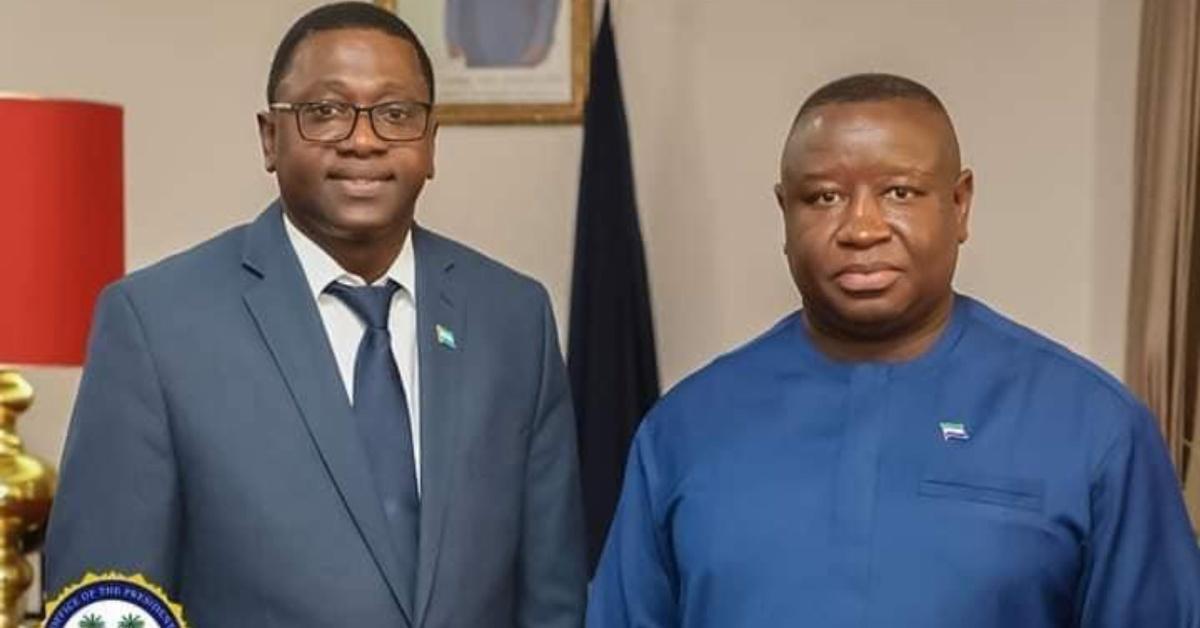Foday M. Daboh
Africa-Press – Sierra-Leone. When Bangura took office, inflation was raging above 50 percent in late 2023. By mid-2025, it had been wrestled to single digits, with Statistics Sierra Leone recording year-on-year headline inflation at 7.10% in June 2025 and 5.85% in August 2025.
This disinflation did not happen by accident. It reflected tighter monetary-fiscal coordination, disciplined cash management, and a recalibration of food and fuel price pass-throughs, supported by a steadier exchange rate and improved market signaling.
The Ministry of Finance itself traces the glide-path from 54.5% (Oct 2023) to 13.8% (Dec 2024) and then to 7.1% (June 2025)—underscoring a sustained policy effort rather than a one-off shock.
The macro framework he steered was anchored in an IMF Extended Credit Facility (ECF) arrangement, which provided a rules-based backbone for restoring stability—tackling fiscal dominance, rebuilding reserves, and, crucially, bringing down inflation. Under Bangura’s watch, Sierra Leone not only secured this program but also maintained review momentum, helping to lock in credibility with markets and development partners while creating space for social spending and investment.
What distinguishes Bangura is that he paired stabilization with institution-building. On the fiscal side, his team advanced domestic revenue mobilization—from modernizing GST and customs administration to broadening the taxpayer net—while keeping expenditure rationalization on the table when revenues under-performed.
He framed subsequent budgets around realistic financing and disciplined execution, including at the FY2026 National Policy Hearing, where he outlined “innovative domestic revenue” options to fund the government’s Big Five priorities. That emphasis on credible financing, not just wish-lists, is part of why inflation expectations cooled.
Bangura’s reforms also reached into integrity and regional leadership. In July 2025, he assumed chairmanship of GIABA’s Ministerial Committee (the ECOWAS anti-money-laundering body), where he pushed to move countries from “technical compliance” toward demonstrable effectiveness in combating financial crime. That stance matters at home: stronger AML/CFT outcomes reduce illicit financial flows, help protect the banking system, and improve Sierra Leone’s standing with investors—another channel through which macro stability is reinforced.
The growth story is cautiously improving as well. With inflation easing and macro policies holding, multilateral forecasts see demand recovering and growth firming over the medium term—evidence that stabilization is beginning to translate into real-economy tailwinds. While external headwinds (commodity prices, weather shocks) remain, the policy mix is now better designed to absorb them than it was two years ago.
Is he Sierra Leone’s best finance minister? History will debate that. But on the data, Bangura presided over one of the country’s sharpest disinflation episodes on record, embedded it within a rules-based program, broadened domestic revenue conversations beyond platitudes, and elevated Sierra Leone’s voice on financial-integrity standards. For a small, shock-prone economy, that combination—credible macro stabilization, fiscal realism, and institutional upgrades—is precisely what “best in class” looks like.
By Foday M. Daboh, BA (Hons) Political Science & International Relations, University of Pennsylvania; Master of Public Policy (Institutional Policy & Political Economy); Postgraduate Certificate in Applied Behavior Analysis.
Source: Sierraloaded
For More News And Analysis About Sierra-Leone Follow Africa-Press






